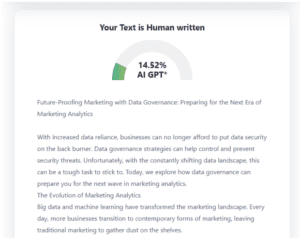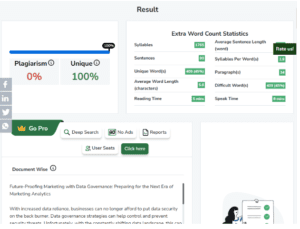With increased data reliance, businesses can no longer afford to put data security on the back burner. Data governance strategies can help control and prevent security threats. Unfortunately, with the constantly shifting data landscape, this can be a tough task to stick to. Today, we explore how data governance can prepare you for the next wave in marketing analytics.
The Evolution of Marketing Analytics
Big data and machine learning have transformed the marketing landscape. Every day, more businesses transition to contemporary forms of marketing, leaving traditional marketing to gather dust on the shelves.
What’s pushing these changes, you might ask?
Data-driven marketing is simply more precise and more effective than traditional strategies.
Think of traditional marketing as casting a wide net, hoping to catch a few fish. You place an ad on a billboard, people see it, and hopefully, they’re motivated to buy.
Data-driven marketing is the opposite. It targets specific groups of people based on collected information and only advertises to audiences who are more likely to get your product or service.
Nowadays, we have more data than ever before—from social media likes to online purchase history. Machine learning algorithms sift through this data, spotting patterns and trends faster than any human could. This allows companies to predict what customers will want, personalize their experiences, and even spot risks before they happen.
Preparing for the Next Era: Trends and Predictions
New technologies like Artificial Intelligence (AI) and the Internet of Things (IoT) are changing consumer behavior. It increases expectations for more personalized and efficient shopping experiences. If left unmet, companies risk losing loyal customers and taking a hit on their bottom line.
Plus, let’s not forget the ever-changing regulatory landscape. More and more, companies are being fined for data misuse. As privacy concerns grow, legislation will continue to evolve, keeping businesses on their toes.
Understanding Data Governance
Data governance is a strategic approach to managing the challenges mentioned above. It ensures that data is accurate, consistent, and secure, thereby enhancing the quality of business insights.
The quality of data directly influences business performance. Poor data quality can distort insights and lead to strategic errors. Regulatory compliance is another critical component of data governance. Ignoring regulations can lead to severe financial penalties and damage to the organization’s reputation.
Future-Proofing Marketing Through Data Governance
So, how do you future-proof your salesforce and ensure success for your business? The following tips can help:
Tip #1: Aligning Data Governance with Marketing Goals
Your data governance strategy and marketing goals should be best friends. They need to work together to provide you with the best results. So, before finalizing your marketing plan, think about what you want to achieve.
Do you want to increase brand awareness? Or is it customer retention that you want to improve? Make sure your data management processes are helping you reach these goals.
Tip #2: Integrating Tools and Platforms
As part of future-proofing, it’s important to embrace the integration of tools and platforms that facilitate data governance practices. These tools can enhance data accessibility, ensure its accuracy, and automate routine tasks. From CRM systems to marketing automation platforms, the integration of these tools can streamline marketing operations and improve overall data management.
Tip #3: Ensuring Data Privacy and Security
We’ve all heard the stories of companies getting fined for data misuse. In some jurisdictions, fines can reach astronomical figures, even into millions of dollars or more. However, this isn’t just about the financial penalty—it’s about trust, reputation, and customer loyalty.
When customers trust you with their personal information, they’re putting their faith in you to keep it safe. If that trust is broken through data misuse or a security breach, rebuilding that relationship is a tough uphill battle. Ensuring data privacy and security should be a cornerstone of your data governance plan.
Tip #4: Training and Educating Marketing Teams
Marketing teams have a lot to keep up with when it comes to data governance. It’s up to the company to provide them with proper training and tools to help them use customer data ethically and effectively.
Consider the following:
- Understanding Data and Its Potential: Ensure your team understands what data is available, where it comes from, and how it can be used. Regular training sessions can provide insights into the types of data your business collects, how it’s stored and managed, and the potential it holds for driving marketing strategies.
- Skills Development: Focus on developing the specific skills your team needs. This could include training on using data analysis tools, interpreting data, or crafting data-driven marketing strategies.
- Data Ethics and Compliance: Your team should understand the laws governing data use in your industry, such as GDPR or the Consumer Privacy Protection Act. They should also understand the ethical implications of data use, such as respecting customer privacy and securing personal information.
- Staying Up-to-Date: The world of data is always evolving. Regular ongoing education sessions can help keep your team up-to-date on the latest best practices, technologies, and regulations.
Wrapping Up
Data governance isn’t just about avoiding fines or securing data. It’s a critical part of future-proofing your marketing strategy. By implementing sound data governance practices, you can adapt proactively to future trends and stay ahead of the competition. Use this guide to navigate the complexities of this ever-evolving marketing landscape.




